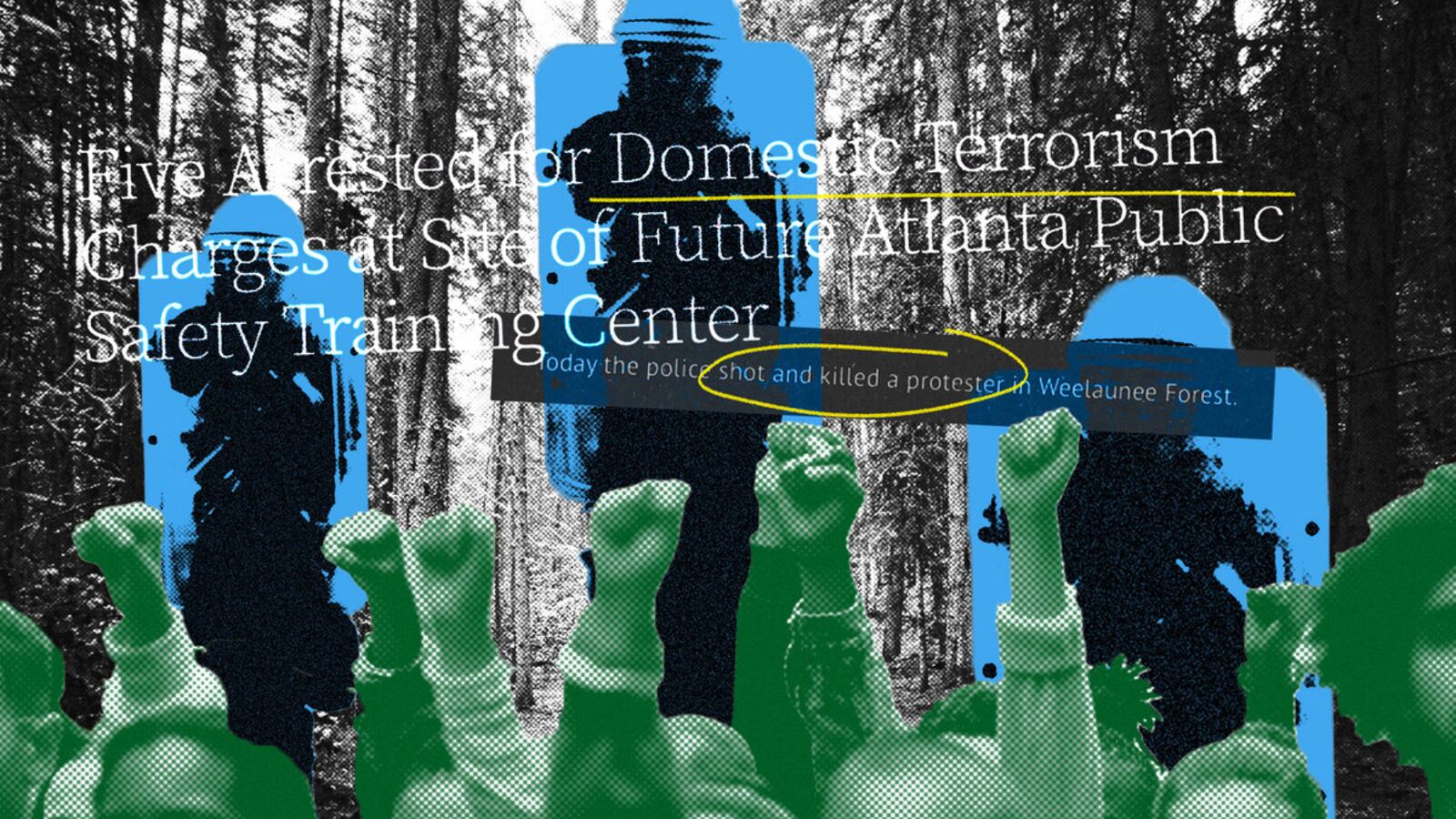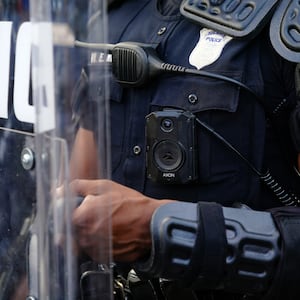ATLANTA—By around 1 a.m. on Thursday, an activist identified in jail records as Timothy Murphy, but who tends to go by another name, said they had been without food or water for some 16 hours while perched “incredibly high” up in a tree. The 25-year-old was, by their own account, acting as a sort of sentry—guarding a forest from the forces trying to transform it into a colossal and controversial new police and firefighter training facility dubbed Cop City.
It had been hours, Murphy told The Daily Beast in text messages, since law enforcement had ordered arborists to lop off the limbs that, for weeks, held activists’ food and makeshift shelter—hours since police shot dead a nearby fellow “tree sitter” after, authorities claimed, cops were fired upon first. (Activist groups have called the shooting a “murder,” and police have claimed there is no body-cam footage of the incident.) Still, even after hearing the piercing crack of gunfire a few hundred feet away, their muscles sore, throat parched, and stomach growling, Murphy said they did not budge—not until their arrest around 7 a.m.
The Wednesday morning shooting death of protester Manuel Teran, coupled with the domestic terrorism charges)" href="https://urldefense.com/v3/__https://gbi.georgia.gov/press-releases/2022-12-14/five-arrested-domestic-terrorism-charges-site-future-atlanta-public__;!!LsXw!U2g0w8Y85Y3vQiKxYzDXRBpD3sl3a18pS-ilt9_lTMDg1RTBTw_75BxjAcDQzZnDtzYo4ude18wncqWlmW_pmJy6fAWQy9Y$">domestic terrorism charges against those fighting to thwart the development, marked a major escalation in the fight over the South River Forest, which encompasses hundreds of acres just southeast of the city of Atlanta. It also represented a sort of capstone to months of chaos in a city grappling with a recent legacy of police brutality and anti-cop rage on one hand, and anxiety about crime on the other.
The size of the protesters’ coalition has been difficult to measure. Hundreds attended an intown vigil after Teran’s death, which splintered into a march down busy streets that had demonstrators littering roads with e-scooters and uprooted street signs.
Activists say they’re waging a war against police misconduct and militarization and climate injustice, bullied by cops leveraging increasingly aggressive tactics, including the deployment of chemical agents, rubber bullets, and, now, real rounds of ammunition. But law enforcement authorities, led by the Georgia Bureau of Investigation—which declared that Teran fired first and “without warning,” injuring a state trooper—have deemed demonstrators terrorists hellbent on sowing chaos and anarchy. Police have accused them of, among other things, hurling rocks and glass bottles at squad cars, and even using molotov cocktails)" href="https://urldefense.com/v3/__https://www.atlantanewsfirst.com/2022/05/17/protesters-arrested-near-planned-site-atlantas-public-safety-training-center/__;!!LsXw!U2g0w8Y85Y3vQiKxYzDXRBpD3sl3a18pS-ilt9_lTMDg1RTBTw_75BxjAcDQzZnDtzYo4ude18wncqWlmW_pmJy6mkcPIx8$">even using molotov cocktails to stunt construction activity.
Cops arrested Murphy early Thursday morning, charging them with domestic terrorism after surrounding them, beaming them with floodlights, and pelting them with pepper ball rounds, they said. The demonstrator was believed by activists to have been the last person living in the trees, and their removal left the movement’s future with a question mark.
Murphy—who claimed before their arrest, “I have thrown jack shit and have continually told arborists and cops I want peace”—added that they think the terrorism charges could embolden others to back the movement, and perhaps even become tree-sitters themselves.
“I always have doubts and dreams,” they said, “but to see the individual support in this community, I try to let the hope win.”

The police-protester clash came to a head in 2021, when the Atlanta City Council green-lit the development of the 85-acre public safety training center in one of the city’s largest green spaces, despite hours of public comments rebuking the proposal. Tensions really spiked when heavy machinery began chewing through the forest. It was a remarkable turnaround in a city that toyed with defunding the police after serving as a locus for George Floyd protests in 2020—in part because of the fatal shooting of 27-year-old Rayshard Brooks in an Atlanta Wendy’s parking lot.
And as the intensity of the protests escalated, you didn’t have to be a full-time activist to get caught up in the scrum.
When Atlanta native Barry Williams laced up his running shoes for a jog through his neighborhood forest on Dec. 13—something he does nearly every day—he didn’t imagine he’d wind up staring down the business end of a cop’s rifle. “As I was running and saw the first cops, they pointed guns at me,” he told The Daily Beast last month.
Williams said he was detained for three hours, but ultimately released amid the forest clearing operation that netted the first six terrorism charges lodged against Cop City protesters. Those arrested included 22-year-old Ariel Ebaugh, who was found in possession of a Glock handgun, per the arrest report. An attorney for Ebaugh declined to comment.
Williams said the so-called “forest defenders” he’d met while running had always seemed docile and unlikely to cause trouble, and he suggested they were abused by police. None of the law-enforcement agencies involved in the operation responded to requests for comment for this story. But Ryan Millsap, the film executive who in 2020 acquired 40 acres on the southeast side of the forest in a land swap deal with DeKalb County, sees things differently.
Even before Millsap razed one of the forest’s entrances)" href="https://urldefense.com/v3/__https://saportareport.com/dekalb-parkland-owner-demolishes-park-entrance-after-protester-arrests/sections/reports/johnruch/__;!!LsXw!U2g0w8Y85Y3vQiKxYzDXRBpD3sl3a18pS-ilt9_lTMDg1RTBTw_75BxjAcDQzZnDtzYo4ude18wncqWlmW_pmJy6mdgUG7s$">razed one of the forest’s entrances, preparing the site for redevelopment, #StopCopCity activists were trashing his land with anti-law enforcement graffiti and litter, he said in an interview. “They’ve been to my personal residences and spray painted and left menacing messages,” Millsap said, adding, “If these guys were a mafia, you’d just call it organized crime and intimidation.”
Outside the park’s now demolished entrance, tags read, “If this park isn’t safe, Millsap isn’t either,” “KILL COPS,” “EAT THE RICH,” and “VOTE WITH YOUR MOLOTOV COCKTAIL,” according to images reviewed by The Daily Beast.
Millsap also finds himself entangled in a court battle)" href="https://urldefense.com/v3/__https://www.ajc.com/neighborhoods/dekalb/groups-ask-court-to-stop-destruction-near-cop-city-site/Q6DHLJUY3ZEM7H4TRYPUZTZMPI/__;!!LsXw!U2g0w8Y85Y3vQiKxYzDXRBpD3sl3a18pS-ilt9_lTMDg1RTBTw_75BxjAcDQzZnDtzYo4ude18wncqWlmW_pmJy6isf3UKg$">entangled in a court battle with groups like the South River Forest Coalition and the South River Watershed Alliance, plaintiffs who align with the forest protection movement—and who consider the land swap legally sketchy. Demonstrators, who call the forest the “Weelaunee People’s Park,” nodding to a Native American moniker for the area, fancy Millsap a cop-loving colonizer, come to privatize public land.
“I’m certainly a pro-good law enforcement in a country guy,” he told The Daily Beast, arguing that local cops currently have “inadequate” training facilities and need an upgrade. “I certainly believe in the rule of law and the enforcement of law.”
Millsap continued: “Ideologically, I have a deep respect for private property. A lot of the wealth in this country has been created over hundreds of years because of very clear property rights, and for people to believe they can just usurp other people’s property rights—it’s a very dangerous road to go down as a culture.”
Before their Thursday morning arrest, Murphy—who arrest records indicate is from Maine—said they knew they risked landing a terrorism charge when they joined the fight a few weeks ago. That didn’t dissuade them from trying to protect the tree canopy and, they said, curb police militarization—even as the protest took a turn toward the lethal.
“The term ‘domestic terrorism’ is an incredibly frightening piece of language that is supposed to incite fear,” Murphy said. But when they get out of jail, they added, they won’t give up the fight, even if they have to give up camping in the forest.
“Tree-sitting isn’t only it,” they said. “We are trying to educate and have people recognize the importance of nature and the dangers of a police state.”







